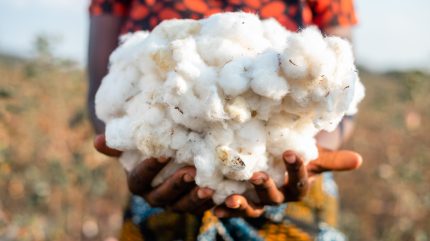
AbTF’s report shared insights on how its partners in Africa have implemented the requirements of the CmiA and CmiA Organic standards.
It explained independent third parties assessed the implementation of its requirements in cotton fields and ginneries through regular verifications.
In 2023, 23 verifications were conducted across 20 cotton companies in 11 countries south of the Sahara, with 13 at the field level and 10 at ginneries (which represent the first step in processing the raw material).
The verification results showed significant improvements since 2022. For instance, partners earned excellent scores in terms of small-scale farmers’ access to high-quality inputs and pre-financing, as well as the availability of cotton fibre.
AbTF highlighted “excellent” scores were also awarded for criteria related to transparency in the supply chain, including compliance with traceability requirements for CmiA cotton in the chain, a transparent classification and payment system for seed cotton, and timely payments to CmiA-contracted farmers.
Meanwhile, dignified working conditions and support for small-scale farmers were evaluated as “very good”, attributed partly to the emphasis placed on protecting the rights and health of employees and labourers through appropriate working hours.

US Tariffs are shifting - will you react or anticipate?
Don’t let policy changes catch you off guard. Stay proactive with real-time data and expert analysis.
By GlobalDataRegarding environmental aspects, AbTF noted that CmiA cotton continues to be cultivated “strictly” without genetically modified seeds and without irrigation using surface water or groundwater.
“Verifications ensure the credibility of our standards. The latest results clearly show that our close collaboration with local partners, some of whom we have worked with for years, is making cotton cultivation in Africa better and more attractive in the long term,” said Elena Wahrenberg, CmiA’s verification manager at AbTF.
She added that their extensive training programmes will continue to build up the adaptability and resilience of small-scale farmers and their systems.
In addition to the verification results, the report also detailed AbTF’s various 2023 initiatives, including increased investment in innovation and communication to support its partners in implementing the standards’ requirements.
Moreover, multilateral collaborations — including the recently established Innovations Club, the CAR-iSMa project for promoting adaptation to climate change, and the development of the organic cotton sector in Benin — reportedly played a key role in achieving success. Regional workshops, interdisciplinary professional development activities, and cotton-specific training for farmers were also key components.
AbTF said this approach will be maintained in 2024, and investment will be made in further developing communication and training formats to sustain and refine the quality of the results, stating that a priority in this regard will be adapting to climate change’s effects on agriculture.
It emphasised that cotton companies working with AbTF under CmiA standards are committed to responsible business practices, continuous improvement, and effective management systems, all of which are evaluated by independent third parties on an ongoing basis through the verification process.
In March, the AbTF Cotton Conference called for integrating a combination of innovative technologies and indigenous knowledge to support regenerative farming methods.



